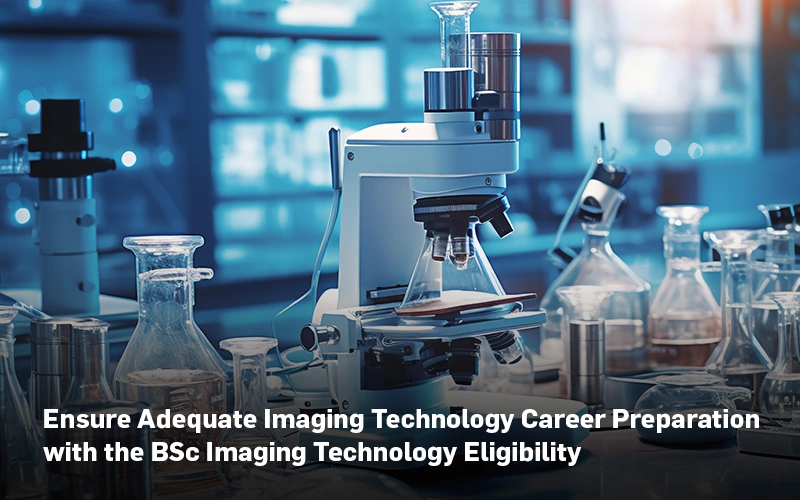

In this article
ToggleThe public’s belief in medical technology has always been the highest. All individuals, whether educated or uneducated, believe that if something has happened to them, then a medical test that creates images of parts of the body will help doctors diagnose possible health conditions, treat them, and eventually cure them. So, the field of Imaging Technology has always been and will always be a profitable field. COVID times are a stern testimony of the highest demand for imaging technology professionals.
To make a career in Imaging technology, one has to pursue a BSc in Imaging technology. This programme prepares students to use imaging technology to diagnose different illnesses and conditions in the human body. It equips individuals with a fast-growing and highly sought-after healthcare career. However, before venturing into the field, knowing the eligibility for BSc imaging technology is important.
A solid understanding of the eligibility criteria for a B.Sc. in Imaging Technology is a crucial first step because it sets clear expectations for your academic journey. Knowing the programme’s prerequisites allows you to assess your current qualifications and plan any necessary coursework to meet the requirements. This proactive approach ensures you’re well-positioned for application success and ready to begin your studies in this exciting field. Let us examine the BSc Imaging technology eligibility.
As per the common BSc Imaging Technology Eligibility, candidates must have scored at least 45% in Intermediate (10+2) with Botany, Zoology, Physics, and Chemistry (40% for reserved categories). Alternatively, they can have completed an Inter vocational course in Biological and Physical Sciences or APOSS with Biological Sciences and Physical Sciences. Additionally, they should be 17 years old.
After knowing your targeted programme’s eligibility, it is important to know its fees. Let’s look at the common fee for a BSc in Imaging Technology to get an idea of the expenses.
The fee of any programme depends upon various factors, including the university, location, infrastructure, faculty expertise, curriculum, reputation, financial aid to students, etc. Yet the Common BSc Imaging Technology fee is around 3,00,000. Aspiring students are advised to go through their targeted university’s prospectus or site to check for the availability of scholarships and their eligibility.
One of the students’ most important concerns is knowing about their career options in their chosen field. Though we have already discovered that imaging technology is a growth-oriented, prevalent field, let us examine its career options in detail.
After completing a BSc in imaging technology, students have various career options. These career options offer stable employment opportunities in a high-demand field and allow them to play a crucial role in patient care and scientific advancement. The common career options after pursuing a BSc in Imaging technology are:
And more!
Remember that the given options are just a few examples of the many available to Imaging Technology graduates. Also, these career options affirm that BSc in Imaging technology graduates are highly in demand.
Now that we know about the BSc in Imaging Technology programme in detail, including its introduction, eligibility, fees, and career options, it is important for aspiring students to know that pursuing a top-notch programme is important, but pursuing that programme from an esteemed university is even more important. The offers one of the best B.Sc. Imaging Technology programme. Let us see how!
The Apollo University is an acclaimed university that offers a four-year B.Sc Imaging Technology programme that prepares students to use imaging technology to identify different diseases and disorders within the human body. Furthermore, this course provides students with an understanding of how radiology and imaging technology are used in medical facilities to accurately diagnose patients and illnesses.
The module aims to teach students about physics in relation to radiology, radiographic and diagnostic imaging techniques, radiographic photography, and image processing. The course, part of the Apollo Group, focuses on a contemporary medical curriculum to prepare graduates for a successful medical career in the 21st century by providing them with the necessary knowledge, skills, and values.
A Bachelor of Science degree in Imaging Technology prepares individuals for a career in the healthcare industry. Knowing the programme’s requirements is crucial to assessing qualifications and preparing for any necessary additional coursework.
A student must have scored at least 45% in Intermediate exams or equivalent courses and be at least 17 years old to be eligible. Graduates can work as CT, X-ray, and MRI technicians, optical lab techs, and sonographers. The Apollo University offers a four-year B.Sc. programme in Imaging Technology, teaching advanced healthcare techniques for diagnosing diseases. Take the first step towards a successful healthcare career and enrol in the B.Sc. in Imaging Technology programme now.
Why should I pursue a BSc in Imaging Technology?
Pursuing a B.Sc. in Imaging Technology could lead to a satisfying and enriching career if you have a strong interest in technology, science, and healthcare.
Is Pursuing a BSc in Imaging Technology worth it?
Indeed, a BSc in Imaging Technology is one of the most growth-oriented, prosperous and fulfilling careers.
How much does a CT scan technician earn?
A CT scan technician usually earns between 2 and 5 lakhs, depending on skills, experience, etc.
Are the BSc in Imaging technology graduates called doctors?
No, in healthcare settings, they are usually addressed by their professional title, such as “imaging technologist”, or by their specific role, such as “radiologic technologist” or “medical sonographer.”
